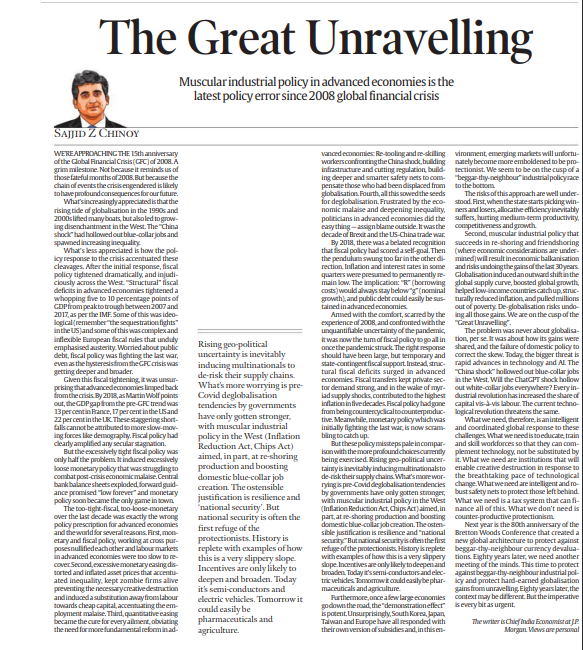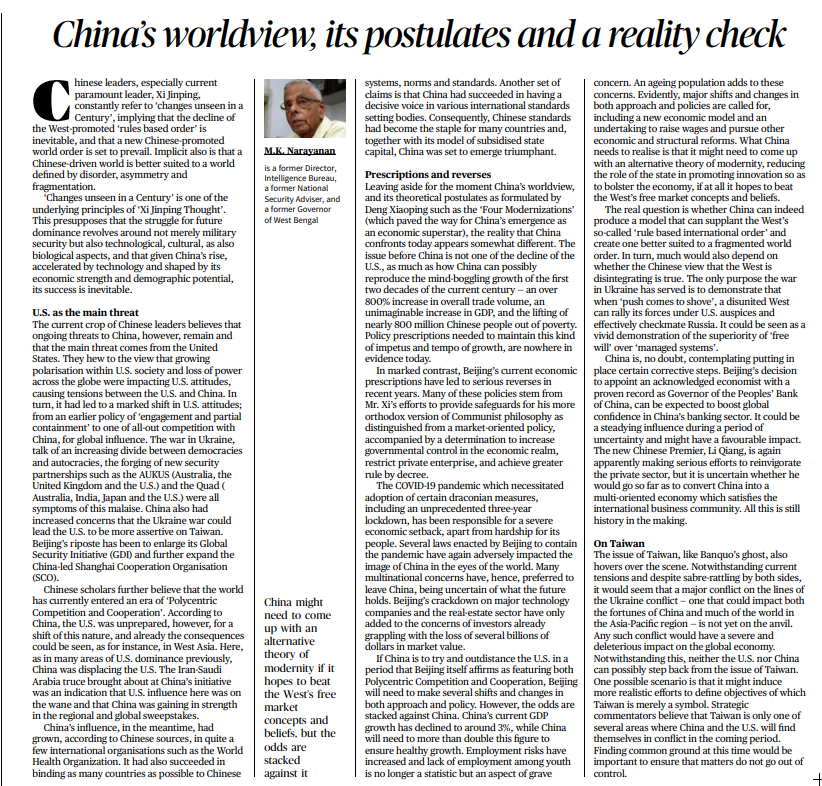Topics:
- The Consequences of Global Financial Crisis and Misguided Policy Responses: Navigating the Path Forward
- The Unfolding Geopolitical Shift: China’s Vision of a New World Order.
The Consequences of Global Financial Crisis and Misguided Policy Responses: Navigating the Path Forward
Context
The impending 15th anniversary of the Global Financial Crisis (GFC) of 2008 marks a crucial juncture to reflect on the far-reaching consequences of the crisis and the subsequent policy responses.
The interconnectedness of global economies led to a rise in discontent in the West due to job losses caused by globalization and the “China shock.”
However, the policies implemented after the crisis, characterized by tightened fiscal policies and loose monetary policies, exacerbated existing inequalities and hindered sustainable recovery.
Globalization’s Discontent and the China Shock
- Globalization during the 1990s and 2000s brought economic benefits but also bred dissatisfaction in Western economies due to job losses and growing inequality.
- The “China shock” intensified blue-collar job losses and further widened inequality in the West.
Post-Crisis Policy Responses Amplifying Disparities
- Following the GFC, fiscal policies in advanced economies were tightened significantly, with structural fiscal deficits decreasing by 5-10% of GDP from peak to trough between 2007 and 2017.
- The tightening was partly ideological and partly driven by inflexible European fiscal rules, emphasizing austerity.
- This austerity-oriented policy approach hindered effective recovery and amplified the impact of the crisis on labor markets.
Tight Fiscal Policies and Loose Monetary Policies: A Wrong Prescription
- Excessive fiscal tightening slowed down advanced economies’ recovery from the crisis.
- The simultaneous loose monetary policy aimed at combating post-crisis economic malaise led to distorted asset prices and increased inequality.
- Quantitative easing was favored over fundamental reforms, hindering necessary adaptations to the changing economic landscape.
Deglobalization and Policy Shifts
- Policy errors led to a sense of economic malaise and rising inequality, prompting political blame games, as seen in Brexit and the US-China trade war.
- By 2018, recognition grew that fiscal policy had backfired, leading to a shift towards loose monetary policy assumptions.
Policy Errors Amidst the Pandemic
- The COVID-19 pandemic prompted an all-in approach to fiscal policy, resulting in structural fiscal deficits in advanced economies.
- Fiscal transfers supported private sector demand but, combined with supply shocks, contributed to the highest inflation in five decades.
- Fiscal policy transformed from countercyclical to counterproductive.
The Rise of Deglobalization and Industrial Policies
- Rising geopolitical uncertainty encouraged multinational companies to de-risk their supply chains.
- Pre-pandemic deglobalization tendencies were strengthened with industrial policies in the West aimed at re-shoring production and creating domestic jobs.
- Concerns about “national security” were invoked as justifications, potentially leading to protectionist measures.
Implications and Risks of Protectionism
- Protectionist industrial policies distort resource allocation, harming productivity, competitiveness, and growth.
- Successful re-shoring efforts may lead to economic balkanization, undoing the gains of globalization over the past three decades.
Addressing Technological Advances and the Future of Work
- Technological advancements and AI pose challenges similar to the “China shock,” potentially impacting white-collar jobs.
- A coordinated global response is needed, emphasizing workforce education, skill development, safety nets, and adaptive institutions.
Conclusion
- The 80th anniversary of the Bretton Woods Conference calls for a new global collaboration to prevent counterproductive industrial policies and protect globalization’s achievements.
- The challenges may differ, but the urgency remains, as globalization’s gains are at risk of unraveling without intelligent, coordinated action.
Source: Indian Express
THE UNFOLDING GEOPOLITICAL SHIFT: CHINA'S VISION OF A NEW WORLD ORDER
Context: Changes Unseen in a Century and the Rise of Xi Jinping Thought
- Chinese leaders, particularly under the current paramount leader, Xi Jinping, have emphasized the emergence of “changes unseen in a Century.”
- This notion is central to Xi Jinping Thought, implying a shift away from the West-promoted ‘rules-based order’ and the rise of a new Chinese-promoted world order.
- China suggests that its model is better suited for a world characterized by disorder, asymmetry, and fragmentation.
- This perspective underscores China’s belief that its success, fueled by technology, economic strength, and demographic potential, is inevitable.
China’s Strategic Assessment: US as the Main Threat
- Chinese leaders perceive the primary threat to their nation’s rise comes from the United States.
- They point to growing polarization within U.S. society, waning global power, and shifts in U.S. attitudes toward competition with China.
- Events such as the war in Ukraine, new security partnerships like AUKUS and the Quad, and concerns about U.S. assertiveness on Taiwan underscore this shift.
- China’s response has been to strengthen its Global Security Initiative (GDI) and expand the China-led Shanghai Cooperation Organisation (SCO), projecting influence across different regions.
Polycentric Competition and Cooperation: China’s Emerging Role
- China asserts that the world has entered an era of ‘Polycentric Competition and Cooperation,’ where it seeks to displace U.S. dominance in various spheres.
- Initiatives like brokering the Iran-Saudi Arabia truce signal China’s growing strength in global politics.
- Beijing has increased influence within international organizations, such as the World Health Organization, and has worked to bind countries to Chinese systems and norms.
- China’s strategic focus also includes playing a decisive role in international standards setting bodies.
Reality Check: Challenges and Reverses
- Contrary to its grand vision, China faces challenges in sustaining its impressive growth. Economic prescriptions that emphasize governmental control and curtail private enterprise have led to setbacks.
- The COVID-19 pandemic and associated measures resulted in economic hardships and negatively impacted China’s global image.
- Beijing’s crackdown on technology companies and real estate sectors further fueled investor concerns.
- China’s GDP growth has slowed to around 3%, necessitating significant policy shifts to maintain growth.
Shifting Paradigms: Navigating a Complex Future
- China’s ability to outpace the U.S. in the era of Polycentric Competition and Cooperation requires substantial policy changes.
- A new economic model, greater structural reforms, higher wages, and reduced state intervention in innovation are necessary to compete with the West’s free-market concepts.
- Whether China can create an alternative modernity that challenges the West’s ‘rule-based international order’ remains uncertain.
The Taiwan Conundrum: Implications for Stability
- The Taiwan issue looms large, and while major conflict is not imminent, tensions persist.
- China and the U.S. are unlikely to back down on Taiwan, potentially leading to a broader conflict with dire global economic consequences.
- Experts foresee multiple areas of conflict between the two powers beyond Taiwan, necessitating efforts to find common ground and prevent uncontrolled escalation.
Conclusion: Navigating a Shifting Global Landscape
- China’s aspirations for a new world order challenge the established Western-dominated order.
- While its rise has been impressive, China faces obstacles in sustaining growth and adapting to a changing global environment.
- The ongoing power struggle between China and the U.S. will define the geopolitical landscape of the 21st century, impacting not only the two nations but the entire world.
- As both powers seek to redefine their roles and influence, their ability to cooperate and find common ground will be crucial in shaping a more stable and prosperous global future.
Question:
As China and the United States navigate their respective roles in a shifting global landscape, how important is finding common ground and cooperation between the two powers in shaping a stable and prosperous global future?
Source: The Hindu



